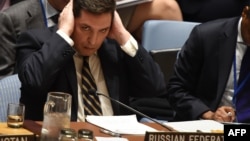Evidence suggests Bashar al-Assad’s regime used chemical weapons in the town of Khan Sheikhoun in Syria’s Idlib province on April 4. In response to that attack, the U.S. carried out a cruise missile strike on a Syrian air base.
In an article dated April 7, the president of the Institute of the Middle East, Yevgeny Satanovsky, was quoted as saying the U.S.-led coalition “doesn’t care where the chemical weapons are coming from” since “their only goal is to overthrow Assad.”
Satanovsky told “Parlamentskaya Gazeta,” the official newspaper of Russia’s parliament, that the Russian military had given the U.N. ”soil samples, fragments and shells” containing sarin used in Aleppo (in an August 2015 incident), but that the U.N. ignored this evidence because “no one intended or intends to test them or investigate the details of the case.”
Satanovsky referred to the Russian Defense Ministry’s claim that the April 4 incident in Idlib province was accidently caused by a Syrian air force strike on a terrorist-held facility where sarin was being stored or manufactured. Polygraph.info previously found that Defense Ministry claim to be false.
Satanovsky said the April 4 incident is being blamed on Assad as part of a campaign to overthrow him.
The public affairs office of the Organization for the Prohibition of Chemical Weapons (OPCW), an intergovernmental organization based in The Hague, told Polygraph.info in an email that Satanovsky’s claim that Russia turned over to the U.N. soil samples, fragments and shells with sarin from the earlier incidents in Aleppo “is incorrect.”
The Fact Finding Mission (FFM) is a joint body of the United Nations and the OPCW established in 2015 to investigate any recorded incidents involving the suspected use of chemical weapons in Syria.
The United Nations press office in New York City told Polygraph.info via email that the FFM is “conducting an investigation” into the April 4 incident as well as into the earlier incidents, including one in Aleppo.
According to the OPCW, the Russians offered to provide the FFM with the samples and other materials from Aleppo. In response, the FFM contacted the Russian Foreign Ministry by telephone to arrange where the samples should be delivered, proposing two options – Damascus or The Hague. The Russian side, however, never responded to the proposal and never delivered the samples.
